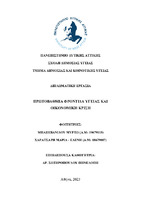| dc.contributor.advisor | Σωτηροπούλου, Πηνελόπη | |
| dc.contributor.author | Μπαξεβανίδου, Μυρτώ | |
| dc.contributor.author | Χαρατσάρη, Μαρία-Ελένη | |
| dc.date.accessioned | 2023-03-10T09:04:06Z | |
| dc.date.issued | 2023-03-03 | |
| dc.identifier.uri | https://polynoe.lib.uniwa.gr/xmlui/handle/11400/3869 | |
| dc.identifier.uri | http://dx.doi.org/10.26265/polynoe-3709 | |
| dc.description.abstract | Το θέμα της παρούσας εργασίας είναι η Πρωτοβάθμια Φροντίδα Υγείας και η οικονομική κρίση, καθώς και ο τρόπος που οι δύο αυτές έννοιες συνδέονται μεταξύ τους. Σκοπός της εργασίας ήταν να αναζητηθεί η αποτύπωση της οικονομικής κρίσης στην Πρωτοβάθμια Φροντίδα Υγείας, αλλά και τις γενικότερες συνέπειες που επιφέρει η οικονομική δυσχέρεια στην υγεία του πληθυσμού. Από την βιβλιογραφική αναζήτηση προκύπτει ότι η Π.Φ.Υ στην Ελλάδα έχει λειτουργήσει από το 1983 με την ίδρυση του Ε.Σ.Υ., ενώ σύμφωνα με τα σημερινά δεδομένα, οι υπηρεσίες της παρέχονται από διάφορες μονάδες Π.Φ.Υ, όπως είναι οι Τοπικές Μονάδες Υγείας, τα Κέντρα Υγείας κ.α Οι τελευταίες μεταρρυθμίσεις της Π.Φ.Υ (4486/17 και 4931/2022) αποσκοπούν στην ενίσχυση της εύρυθμης και αποτελεσματικής λειτουργίας του Ε.Σ.Υ, κατοχυρώνοντας παράλληλα την καθολική και ισότιμη πρόσβαση στις υπηρεσίες υγείας. Στις μεταρρυθμίσεις αυτές, έχουν τοποθετηθεί ποικίλες επαγγελματικές ενώσεις. Η οικονομική κρίση του 2008 επηρέασε έντονα την Ελλάδα, επιφέροντας επιπτώσεις σε ποικίλους τομείς της υγείας. Πιο συγκεκριμένα, επηρεάστηκε η δομή, η οργάνωση και η λειτουργία του υγειονομικού συστήματος, ενώ η υγεία του πληθυσμού υποβαθμίστηκε γενικότερα. Αντίστοιχες επιπτώσεις από την οικονομική κρίση υπήρξαν και σε άλλες χώρες της Ευρωπαϊκής Ένωσης.
Συμπερασματικά, προκύπτει ότι η Π.Φ.Υ συνδέεται άρρηκτα με την οικονομική κατάσταση μιας χώρας. Όσο ευημερεί οικονομικά μία χώρα, τόσο ευημερεί και ο πληθυσμός της και παράλληλα τόσο πιο ισχυρό το υγειονομικό της σύστημα, ενώ ισχύει και το αντίθετο. | el |
| dc.format.extent | 108 | el |
| dc.language.iso | el | el |
| dc.publisher | Πανεπιστήμιο Δυτικής Αττικής | el |
| dc.rights | Αναφορά Δημιουργού - Μη Εμπορική Χρήση - Παρόμοια Διανομή 4.0 Διεθνές | * |
| dc.rights | Attribution-NonCommercial-NoDerivatives 4.0 Διεθνές | * |
| dc.rights | Αναφορά Δημιουργού 4.0 Διεθνές | * |
| dc.rights | Αναφορά Δημιουργού 4.0 Διεθνές | * |
| dc.rights.uri | http://creativecommons.org/licenses/by/4.0/ | * |
| dc.subject | Πρωτοβάθμια Φροντίδα Υγείας | el |
| dc.subject | Οικονομικές κρίσεις | el |
| dc.subject | Μεταρρυθμίσεις | el |
| dc.subject | Συστήματα υγείας | el |
| dc.subject | ΑΕΠ | el |
| dc.title | Πρωτοβάθμια Φροντίδα Υγείας και οικονομική κρίση | el |
| dc.title.alternative | Primary Health Care and economic crisis | el |
| dc.type | Πτυχιακή εργασία | el |
| dc.contributor.committee | Περηφάνου, Δήμητρα | |
| dc.contributor.committee | Prapas, Christos | |
| dc.contributor.faculty | Σχολή Δημόσιας Υγείας | el |
| dc.contributor.department | Τμήμα Δημόσιας και Κοινοτικής Υγείας | el |
| dc.description.abstracttranslated | The subject of this thesis is Primary Health Care and the financial crisis, as well as how these two concepts are related to each other. The purpose of this thesis was to explore how the economic crisis is reflected in Primary Health Care (PHC), but also the general consequences that the economic hardship brings to the health of the population. According to the bibliographic research, PHC in Greece has been operating since 1983 with the establishment Greece’s National Health System, while according to today's data, its services are provided by various PHC units, such as Local Health Units, Health Centers, etc. The latest reforms regarding PHC (4486/17 and 4931/2022) aim to strengthen the orderly and efficient operation of the National Health System, as well as establish equal access to health services. Various professional associations have expressed their views on these reforms. Furthermore, reference is made to the financing methods of PHC, as well as to the basic models of health systems, which are distinguished based on their organization and financing. In addition, the PHC reforms 4486/17 and 4931/2022 are mentioned, as well as how they were evaluated by various professional associations. The financial crisis of 2008 strongly affected Greece, resulting in a number of negative effects in various sectors of health. More specifically, the structure, organization and operation of the health system were affected, while the health of the population deteriorated in general. Similar effects from the financial crisis were also experienced in other countries of the European Union. In conclusion, it appears that PHC is inextricably linked with the economic situation of a country. The more prosperous a country is economically, the more prosperous its population is and at the same time, the stronger is its health system, while the opposite is also true. | el |
| dcterms.embargoTerms | 6 months | el |
| dcterms.embargoLiftDate | 2023-09-09T09:04:06Z | |


